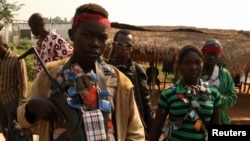As the Central African Republic struggles to end the nearly two-year old cycle of sectarian violence, the plight of some 10,000 children used as soldiers in the conflict serves as a brutal legacy. Often, their release by armed groups is only the first step in a long and traumatized road to try to return to a so-called normal life.
Lionel and Laura - not their real names - had known each other as far back as they can remember. The two friends both grew up in a small town about 150 kilometers from the capital Bangui.
Earlier last year, members of the ex-Seleka rebels arrived and killed Lionel's mother and Laura's father. Angry and eager for revenge, they joined in a rival armed group, said Lionel who was 15 years old at the time. Laura was just 13.
"The word was getting around in the village the anti-balaka militias were enrolling people to fight," he said. Lionel said they joined and were sent to the frontline where they fought “all the time."
This lasted for four months until UNICEF, along with family members, managed to get both children out of the ranks of the anti-balaka. Lionel now lives with his father in Bangui. Laura lives with her aunt.
But reintegration will take far longer than the children’s time in arms. Laura's aunt said they have never talked about what her niece did or experienced while part of the armed group. But she clearly saw how it changed her.
“At home, her life in the armed group is always on her mind. Sometimes, she will make a weapon with bits of wood,” she said.
Her aunt said Laura was trying to prepare other children in the house to be ready to fight because that was what she knew.
The Italian humanitarian agency COOPI provides psychosocial support not only for the children, but also for their family members.
COOPI Psychologist Edouard Konan said it's sometimes difficult for families to understand how their children have changed and they sometimes ended up rejecting them.
“So we explain it to them and we guide them on what attitude to adopt to patch things up, to re-establish a relationship and their heir role as parents, instead of censoring or rejecting their own children,” he said.
COOPI’s aim is to make sure that, ultimately, the child will be accepted back into the family.
But the reintegration is made even more difficult by the fact that many of the children go back to live in the same neighborhood still controlled by the armed groups they used to belong to.
Sometimes, Lionel said, they meet in the street.
“We say ‘hi’ to each other, but it doesn't go further than that,” he said because he never wanted to return to that life.
It took Laura’s family two attempts to convince her to leave the group. Laura said now she was trying to help other children like herself.
“We try to talk to the youngest ones, to tell them to not join the group - and we tell the ones already in it, to go out,” she said.
Lionel and Laura are now back in school. Lionel wants to become a mechanic and Laura a nurse.
They were lucky enough to have been helped by COOPI, partnered with UNICEF, which used to have two programs in CAR dedicated to the reintegration of child soldiers. But since then, they’ve had to dramatically downscale due to the lack of funds.













